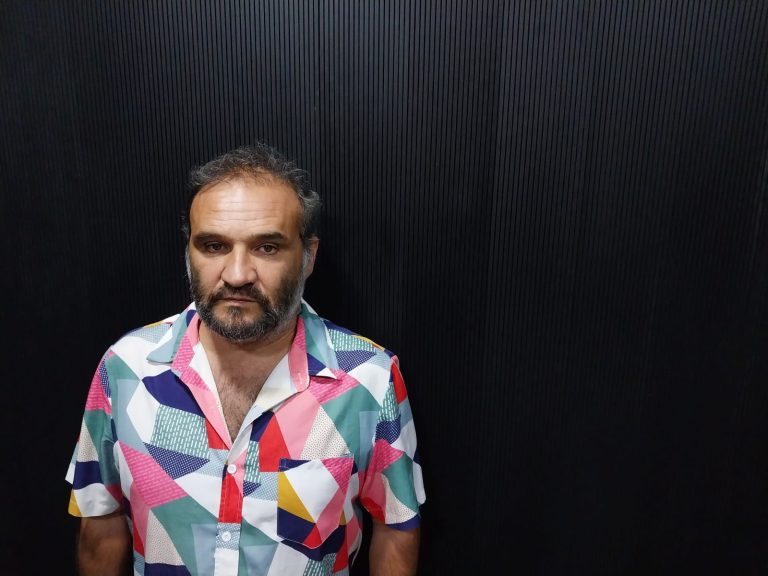São Paulo – “Al-Mu’tamid had been a poet before becoming a king. He was a man whose greatest ambition was to celebrate life in its poetic dimension through writing, and suddenly he had to face war and engage in warfare,” says Carlos Gomes, director of The Poet King, a Portuguese film that had its world premiere in Brazil at the 19th Arab World Film Festival on Saturday (31).
In an interview with ANBA a day before the premiere, Carlos Gomes discussed the film’s theme and how much of himself is woven into the storyline. The Poet King does not recount the history and exploits of King Al-Mu’tamid – it is rather almost a diary of a man who loved writing and who, in the 11th century, ruled the Taifa of Seville on the Iberian Peninsula and lead the wars that such a role entailed.
The film originated from the director’s experience when he came across the book O meu coração é árabe [My Heart is Arab] by Adalberto Alves, which features poetry from centuries past. Moved by the book, Gomes embarked on a personal journey to understand the poet-king Al-Mu’tamid, whose verses were included in the book. At a time when this was uncommon, Al-Mu’tamid wrote in the first person about his feelings toward his father, life, and war.
The film portrays a journey by actor Adriano Carvalho through the places where Al-Mu’tamid lived, while reading the poet-king’s verses, creating a kind of life narrative and personal confession. “The duties of a monarch have always driven me away from closeness with men,” says the poet in the actor’s reading. He describes war as a “fierce waste of life.” Al-Mu’tamid belonged to the last generation of his dynasty, following the reigns of his father and grandfather. Born in Portugal, he ruled in the 11th century and was exiled to Morocco.
Carlos Gomes describes his film as a “musical road movie”. Throughout the actor’s journey, music in Portuguese, Spanish, and Arabic weaves through the cultures present there. For the filmmaker, The Poet King is neither the linear story of Al-Mu’tamid nor the actor’s. “It’s something in between,” he says, aware that it is also his own expedition in search of Al-Mu’tamid. “An alter ego of my own discovery of the character, of my search for who this man from centuries ago truly was,” he explains.
The discovery of the book O Meu Coração é Árabe was, in fact, the second part of the filmmaker’s journey toward identifying with Arabs, even though he does not have any recorded ancestry. The first part occurred during his first trip to Morocco, when he immediately felt at home and was overwhelmed by intense sorrow at the thought of leaving the Arab country. “It was as if I were leaving my own place.” The filmmaker’s family hails from Southern Portugal, where having Arab blood is not uncommon.
But Gomes sees his interest in Al-Mu’tamid as more than just ancestry. “I believe I encountered him at some point in the universe, not in this time or any specific space, but at the intersection of my life and existence with his,” he says. The filmmaker often contemplates how Al-Mu’tamid would act and identifies with the poet king’s conflict. The film’s screenplay, also written by Carlos Gomes, is based on the book Crônica do Rei Poeta Al-Mu’tamid [Chronicle of Poet King Al-Mu’tamid] by Ana Cristina Silva.
Poet King in Brazil
Filmmaker Carlos Gomes chose to premiere The Poet King in Brazil because it was here that he experienced what he calls the “most extraordinary” moment with the concert he created about Al-Mu’tamid. In 2017, Sala São Paulo hosted the performance “Al Mu’tamid, Poet King of Al-Andalus,” the first concert with Arab music at the venue, for which Carlos Gomes was both the producer and artistic director.
“I feel a sense of gift and gratitude towards the festival, Brazil, and the people who supported me at that moment,” he says, mentioning the support from the Institute for Arab Culture (Icarabe), which organized the concert with the Arab-Brazilian Chamber of Commerce (ABCC) and the São Paulo State Symphony Orchestra Foundation (Osesp) as part of the programming for that year’s Arab World Film Festival.
The 19th Arab World Film Festival began on Thursday (29) and is being held at CineSesc in São Paulo until September 4, featuring 11 new films from the Middle East and North Africa. The festival is organized by Icarabe and the Social Service of Commerce (Sesc), with sponsorship from the ABCC, Arab House, and the Sleep Institute.
Read more:
Arab music and poetry a hit in São Paulo concert hall
Translated by Guilherme Miranda




